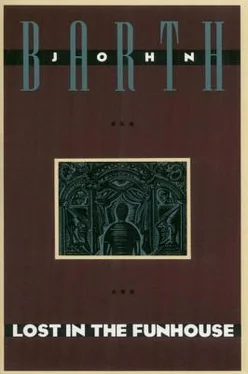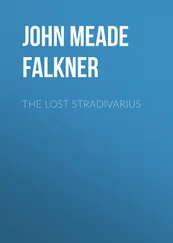John Barth - Lost in the Funhouse
Здесь есть возможность читать онлайн «John Barth - Lost in the Funhouse» весь текст электронной книги совершенно бесплатно (целиком полную версию без сокращений). В некоторых случаях можно слушать аудио, скачать через торрент в формате fb2 и присутствует краткое содержание. Год выпуска: 2014, ISBN: 2014, Издательство: Knopf Doubleday Publishing Group, Жанр: Современная проза, на английском языке. Описание произведения, (предисловие) а так же отзывы посетителей доступны на портале библиотеки ЛибКат.
- Название:Lost in the Funhouse
- Автор:
- Издательство:Knopf Doubleday Publishing Group
- Жанр:
- Год:2014
- ISBN:978-0-8041-5250-1
- Рейтинг книги:3 / 5. Голосов: 1
-
Избранное:Добавить в избранное
- Отзывы:
-
Ваша оценка:
- 60
- 1
- 2
- 3
- 4
- 5
Lost in the Funhouse: краткое содержание, описание и аннотация
Предлагаем к чтению аннотацию, описание, краткое содержание или предисловие (зависит от того, что написал сам автор книги «Lost in the Funhouse»). Если вы не нашли необходимую информацию о книге — напишите в комментариях, мы постараемся отыскать её.
Lost in the Funhouse — читать онлайн бесплатно полную книгу (весь текст) целиком
Ниже представлен текст книги, разбитый по страницам. Система сохранения места последней прочитанной страницы, позволяет с удобством читать онлайн бесплатно книгу «Lost in the Funhouse», без необходимости каждый раз заново искать на чём Вы остановились. Поставьте закладку, и сможете в любой момент перейти на страницу, на которой закончили чтение.
Интервал:
Закладка:
But the reader! Even if his author were his only reader as was he himself of his work-in-progress as of the sentence-in-progress and his protagonist of his, et cetera, his character as reader was not the same as his character as author, a fact which might be turned to account. What suspense.
As he prepared to explore this possibility one of his mistresses whereof he had none entered his brown study unannounced. “The passion of love,” she announced, “which I regard as no less essential to a satisfying life than those values itemized above and which I infer from my presence here that you too esteem highly, does not in fact play in your life a role of sufficient importance to sustain my presence here. It plays in fact little role at all outside your imaginative and/or ary life. I tell you this not in a criticizing spirit, for I judge you to be as capable of the sentiment aforementioned as any other imagin[ative], deep-feeling man in good physical health more or less precisely in the middle of the road of our life. What hampers, even cripples you in this regard is your final preference, which I refrain from analyzing, for the sedater, more responsible pleasures of monogamous fidelity and the serener affections of domesticity, notwithstanding the fact that your enjoyment of these is correspondingly inhibited though not altogether spoiled by an essentially romantical, unstable, irresponsible, death-wishing fancy. V. S. Pritchett, English critic and author, will put the matter succinctly in a soon-to-be-written essay on Flaubert, whose work he’ll say depicts the course of ardent longings and violent desires that rise from the horrible, the sensual, and the sadistic. They turn into the virginal and mystical, only to become numb by satiety. At this point pathological boredom leads to a final desire for death and nothingness — the Romantic syndrome. If, not to be unfair, we qualify somewhat the terms horrible and sadistic and understand satiety to include a large measure of vicariousness, this description undeniably applies to one aspect of yourself and your work; and while your ditto has other, even contrary aspects, the net fact is that you have elected familial responsibilities and rewards — indeed, straight-laced middle-classness in general — over the higher expenses of spirit and wastes of shame attendant upon a less regular, more glamorous style of life. So to elect is surely admirable for the layman, even essential if the social fabric, without which there can be no culture, is to be preserved. For the artist, however, and in particular the writer, whose traditional material has been the passions of men and women, the choice is fatal You having made it I bid you goodnight probably forever.”
Even as she left he reached for the sleeping pills cached conveniently in his writing desk and was restrained from their administration only by his being in the process of completing a sentence, which he cravenly strung out at some sacrifice of rhetorical effect upon realizing that he was et cetera. Moreover he added hastily he had not described the intruder for his readers’ vicarious satiety: a lovely woman she was, whom he did not after all describe for his readers’ et cetera inasmuch as her appearance and character were inconstant. Her interruption of his work inspired a few sentences about the extent to which his fiction inevitably made public his private life, though the trespasses in this particular were as nothing beside those of most of his profession. That is to say, while he did not draw his characters and situations directly from life nor permit his author-protagonist to do so, any moderately attentive reader of his oeuvre, his what, could infer for example that its author feared for example schizophrenia, impotence creative and sexual, suicide — in short living and dying. His fictions were preoccupied with these fears among their other, more serious preoccupations. Hot dog. As of the sentence-in-progress he was not in fact unmanageably schizophrenic, impotent in either respect, or dead by his own hand, but there was always the next sentence to worry about. But there was always the next sentence to worry about. In sum he concluded hastily such limited self-exposure did not constitute a misdemeanor, representing or mis as it did so small an aspect of his total self, negligible a portion of his total life — even which totalities were they made public would be found remarkable only for their being so unremarkable. Well shall he continue.
Bearing in mind that he had not developed what he’d mentioned earlier about turning to advantage his situation vis-a-vis his “reader” (in fact he deliberately now postponed his return to that subject, sensing that it might well constitute the climax of his story) he elaborated one or two ancillary questions, perfectly aware that he was trying, even exhausting, whatever patience might remain to whatever readers might remain to whoever elaborated yet another ancillary question. Was the novel of his life for example a roman à clef. ? Of that genre he was as contemptuous as of the others aforementioned; but while in the introductory adverbial clause it seemed obvious to him that he didn’t “stand for” anyone else, any more than he was an actor playing the role of himself, by the time he reached the main clause he had to admit that the question was unanswerable, since the “real” man to whom he’d correspond in a roman à clef would not be also in the roman à clef and the characters in such works were not themselves aware of their irritating correspondences.
Similarly unanswerable were such questions as when “his” story (so he regarded it for convenience and consolement though for all he knew he might be not the central character; it might be his wife’s story, one of his daughters’s, his imaginary mistress’s, the man-who-once-cleaned-his-chimney’s) began. Not impossibly at his birth or even generations earlier: a Bildungsroman , an Erziehungsroman , a roman fleuve. ! More likely at the moment he became convinced of his fictional nature: that’s where he’d have begun it, as he’d begun the piece currently under his pen. If so it followed that the years of his childhood and younger manhood weren’t “real,” he’d suspected as much, in the first-order sense, but a mere “background” consisting of a few well-placed expository insinuations, perhaps misleading, or inferences, perhaps unwarranted, from strategic hints in his present reflections. God so to speak spare his readers from heavyfooted forced expositions of the sort that begin in the countryside near _____ in May of the year _____ it occurred to the novelist _____ that his own life might be a _____, in which he was the leading or an accessory character. He happened at the time to be in the oak-wainscoted study of the old family summer residence; through a lavender cascade of hysteria he observed that his wife had once again chosen to be the subject of this clause, itself the direct object of his observation. A lovely woman she was, whom he did not describe in keeping with his policy against drawing characters from life as who should draw a condemnee to the gallows. Begging his pardon. Flinging his tiresome tale away he pushed impatiently through the french windows leading from his study to a sheer drop from the then-record high into a nearly fatal depression.
He clung onto his narrative depressed by the disproportion of its ratiocination to its dramatization, reflection to action. One had heard Hamlet criticized as a collection of soliloquies for which the implausible plot was a mere excuse; witnessed Italian operas whose dramatic portions were no more than interstitial relief and arbitrary continuity between the arias. If it was true that he didn’t take his “real” life seriously enough even when it had him by the throat, the fact didn’t lead him to consider whether the fact was a cause or a consequence of his tale’s tedium or both.
Читать дальшеИнтервал:
Закладка:
Похожие книги на «Lost in the Funhouse»
Представляем Вашему вниманию похожие книги на «Lost in the Funhouse» списком для выбора. Мы отобрали схожую по названию и смыслу литературу в надежде предоставить читателям больше вариантов отыскать новые, интересные, ещё непрочитанные произведения.
Обсуждение, отзывы о книге «Lost in the Funhouse» и просто собственные мнения читателей. Оставьте ваши комментарии, напишите, что Вы думаете о произведении, его смысле или главных героях. Укажите что конкретно понравилось, а что нет, и почему Вы так считаете.












